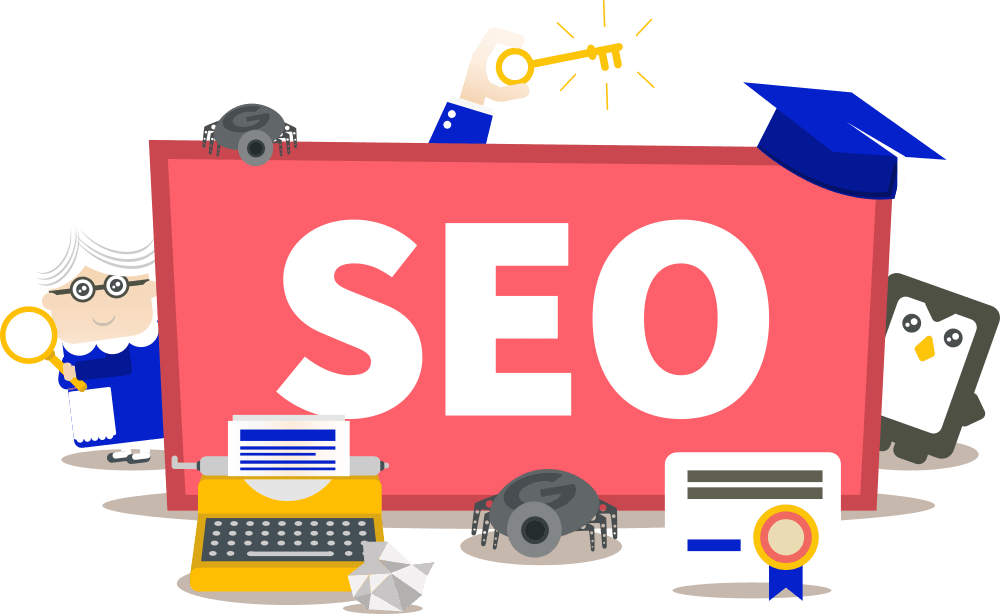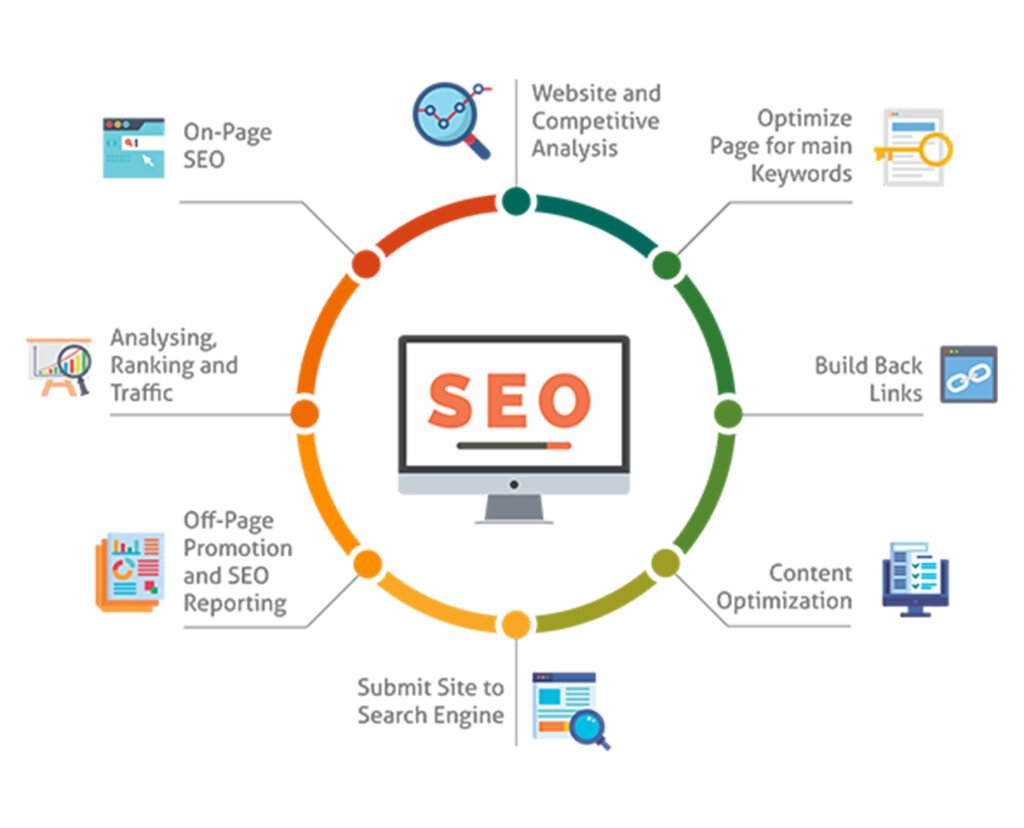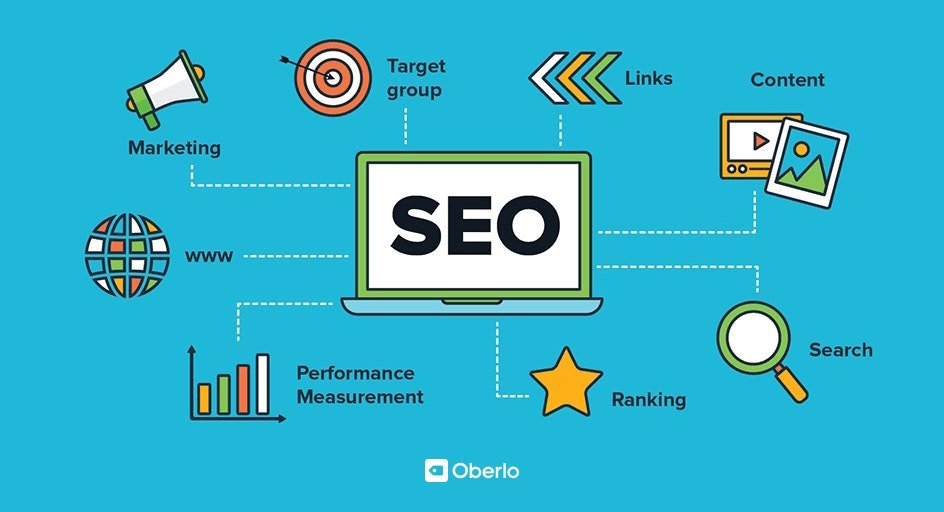Search Engine Optimization
Search Engine Optimization (SEO) refers to the process of optimizing a website and its content to improve its visibility and ranking on search engine results pages (SERPs) for relevant keywords and phrases. The primary objective of SEO is to drive organic (non-paid) traffic to a website by making it more appealing to search engines like Google, Bing, and Yahoo.
Here’s a breakdown of key aspects of SEO:
Keyword Research: Identifying the terms and phrases that users are searching for in relation to your business, products, or services.
On-Page SEO: Optimizing individual web pages to improve their relevance to target keywords. This includes optimizing meta tags (title tags, meta descriptions), headings, URL structures, and content optimization.
Content Quality and Relevance: Creating high-quality, relevant, and valuable content that satisfies user intent and provides solutions to their queries. Content should be comprehensive, engaging, and keyword-rich, while also being user-friendly and easy to read.
Technical SEO: Addressing technical aspects of website optimization to ensure search engines can crawl, index, and understand the site’s content. This includes optimizing site speed, mobile responsiveness, fixing crawl errors, implementing structured data markup (schema.org), and improving site architecture.
Off-Page SEO: Building external signals and backlinks from other reputable and relevant websites to improve the website’s authority and credibility. This involves outreach, guest posting, directory submissions, and social media engagement.
Local SEO (for businesses targeting local customers): Optimizing the website’s visibility for local searches, including optimizing Google My Business listings, local citations, and obtaining positive reviews.
User Experience (UX) Optimization: Providing a positive user experience by optimizing website navigation, ensuring fast loading times, improving mobile responsiveness, and delivering high-quality content that meets users’ needs and expectations.
SEO is an ongoing process that requires continuous monitoring, analysis, and adaptation to changes in search engine algorithms, industry trends, and competitors’ strategies. By implementing effective SEO strategies, businesses can increase their online visibility, attract targeted traffic, and ultimately improve their website’s performance and conversion rates.
It seems like you’re asking if SEO is still relevant or effective. Absolutely, SEO remains a crucial component of digital marketing strategies. Here’s why:
Organic Traffic: SEO helps websites attract organic (non-paid) traffic from search engines. With the majority of online experiences beginning with a search engine, ranking well for relevant keywords can significantly increase visibility and drive valuable traffic to your site.
Credibility and Trust: Websites that rank highly in search engine results pages (SERPs) are often perceived as more credible and trustworthy by users. By optimizing your site for SEO, you can improve its credibility and attract more visitors.
Long-term Strategy: Unlike paid advertising, which stops generating traffic once you stop paying, SEO offers long-term benefits. While it may take time to see results, the efforts invested in SEO can continue to pay off over time, providing a sustainable source of traffic.
Cost-effectiveness: While SEO requires an investment of time and resources, it can be more cost-effective than paid advertising in the long run. Once your site ranks well for target keywords, you can continue to attract traffic without ongoing advertising expenses.
User Experience: SEO involves optimizing various aspects of your website, including site structure, navigation, and content. These optimizations not only improve search engine visibility but also enhance the overall user experience, leading to higher engagement and conversion rates.
Adaptable to Algorithm Changes: While search engine algorithms may change, the fundamental principles of SEO remain relatively constant. By focusing on creating high-quality, relevant content and providing a positive user experience, you can adapt to algorithm updates and maintain your search engine rankings.
Competitive Advantage: In today’s competitive online landscape, having a strong SEO strategy can give you a competitive edge. By outranking competitors in search results, you can attract more traffic, leads, and customers to your website.
SEO is a critical marketing channel. First, and foremost: organic search delivers 53% of all website traffic.
That’s one big reason why the global SEO industry is forecast to reach a staggering $122.11 billion by 2028. SEO drives real business results for brands, businesses and organizations of all sizes.
Whenever people want to go somewhere, do something, find information, research or buy a product/service – their journey typically begins with a search.
But today, search is incredibly fragmented. Users may search on traditional web search engines (e.g., Google, Microsoft Bing), social platforms (e.g., YouTube, TikTok) or retailer websites (e.g., Amazon).
In fact, 61% of U.S. online shoppers start their product search on Amazon, compared to 49% who start on a search engine like Google. Also of note from that same research:
- 32% start on Walmart.com.
- 20% start on YouTube.
- 19% start on Facebook.
- 15% start on Instagram.
- 11% start on TikTok.
Trillions of searches are conducted every year. Search is often the primary source of traffic for websites, which makes it essential to be “search engine friendly” on any platform where people can search for your brand or business.
What this all means is that improving your visibility, and ranking higher in search results than your competition, can positively impact your bottom line,
SEO is also incredibly important because the search engine results pages (or SERPs) are super competitive – filled with search features (and PPC ads). SERP features include:
- Knowledge panels.
- Featured snippets.
- Maps.
- Images.
- Videos.
- Top stories (news).
- People Also Ask.
- Carousels.
Another reason SEO is critical for brands and businesses: unlike other marketing channels, good SEO work is sustainable. When a paid campaign ends, so does the traffic. Traffic from social media traffic is at best unreliable – and a fraction of what it once was.
SEO is the foundation of holistic marketing, where everything your company does matters. Once you understand what your users want, you can then implement that knowledge across your:
- Campaigns (paid and organic).
- Website content.
- Social media properties.
SEO is a channel that drives the traffic you need to achieve key business goals (e.g., conversions, visits, sales). It also builds trust – a website that ranks well is generally regarded as authoritative or trustworthy, which are key elements Google wants to reward with better rankings.



